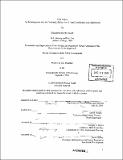True value : an investigation into the valuation behavior of land developers and appraisers
Author(s)
Wolff, Elizabeth B
DownloadFull printable version (2.340Mb)
Other Contributors
Massachusetts Institute of Technology. Dept. of Urban Studies and Planning.
Advisor
David Geltner and Langley C. Keyes.
Terms of use
Metadata
Show full item recordAbstract
The goal of this thesis is to investigate the real world problems associated with valuing a key component of real estate -- raw land. Because land valuation is seen as a risky endeavor that requires investors to make decisions based on outcomes that are uncertain, it offers a unique and interesting realm for evaluating human decision-making behavior. Through contrasting the three different decision processes of 1) the normative approach to valuation that appraisers are trained to employ 2) the true valuation behavior of appraisers in the field, and 3) the true valuation behavior of land developers in the market place, this study seeks to gain insight into real estate valuation behavior. The hypotheses for this thesis are drawn from the core theories of decision analysis and cognitive psychology. Because this study looks at the process of valuation, it focuses on the cognitive shortcuts, formally referred to as heuristics, that humans use to make decisions in complex situations where the outcome of a t.ask is uncertain. In this study, a process tracing technique was employed to study the problem solving behavior of nine land developers and ten appraisers. To compare subject processes, protocols were conceptualized as frequency distributions and were compared using Kolmogorov-Smimov goodness-of-fit tests as well as parametric tests of equal population proportions. The results of the tests showed that according to a model developed by the Appraisal Institute, appraisers and developers behave in a non-normative manner for they take certain cognitive shortcuts that end up altering this model when valuing an asset. The information search behavior of appraisers and developers was also found to be observably different. Further investigation discovered that appraisers look at more comparables than developers, while developers tend to be more interested in incorporating valuation steps that are not prescribed by the nonnative model. The findings of this study lead to serious questions about the efficacy of the Al's current model. In fact, the deviations between appraisers' methodologies and those of the market, as represented by the developers tested, were such that if these discrepancies are not addressed the work of appraisers risks becoming marginalized. Implications for future research were also discussed.
Description
Thesis (S.M. and M.C.P.)--Massachusetts Institute of Technology, Dept. of Urban Studies and Planning, 2003. Includes bibliographical references (leaves 83-85).
Date issued
2003Department
Massachusetts Institute of Technology. Department of Urban Studies and PlanningPublisher
Massachusetts Institute of Technology
Keywords
Urban Studies and Planning.